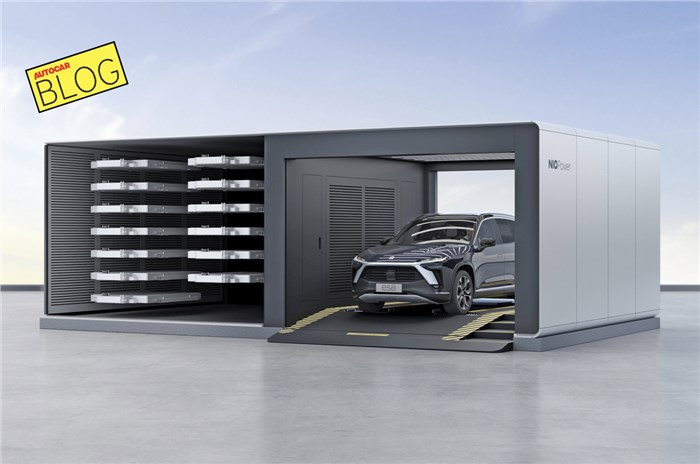Nio’s battery swapping station clocked 30 million battery swaps, each taking roughly the same time as refuelling an ICE vehicle.
Published On Dec 23, 2023 07:00:00 AM
Battery swapping for EVs has been talked about for years but always seemed too far-fetched to work. Yet, Chinese EV manufacturer Nio recently clocked up 30 million battery swaps across its Power Swap Stations network, which is mainly in China but also Europe (and is expected to reach the UK at some stage too).
The advantage is simply time. It takes just 2min 30sec to swap a Nio car’s battery for a fully charged one, so the total process from arrival to departure takes roughly the same time as using a petrol pump – much quicker than the fastest battery charge.
The process is fully automated from start to finish. The driver parks in the station’s recharge area and taps the ‘auto parking’ option that appears on the car’s touchscreen. The car will then park autonomously in the station, coming to rest on a bed of rollers, allowing machinery to minutely position it ready for the swap. Next, a mechanism undoes the 10 ‘bayobolts’ holding the battery in place, drops the battery, moves it aside to a storage area on the right-hand side of the station and installs a fresh one in its place using a locking gun. After the swap is complete, the car performs a health check, and if it passes that, the driver is good to leave.
Nio’s latest (third-generation) station can store 21 batteries, eight more than the previous one, enabling it to complete 30 percent more swaps with a total capacity of 408 per day.
The station uses two LiDAR sensors and Nvidia Orin processors plus Nio’s own ADAS functions to accurately align the car over the ‘gate’ prior to final alignment by the station’s mechanism. In China, the stored batteries are charged on a night-time energy tariff, the lower cost being passed on to users during the day.
Nio’s battery-swapping service has grown at an extraordinary rate. It took 1,506 days for it to reach its first 10 million swaps but only 273 days to reach the next 10 million, and the third 10 million came just 189 days later. Although spreading across all markets and compatible with all Nio models, the technology is exclusive to this one car maker for now.
Nio has, however, entered into a strategic agreement with Shell to build and operate battery charging and swapping facilities, and is open to sharing the technology with other companies. If the industry can break down the barrier of conflicting standards so that every car uses the same battery, much like household devices use AAs or AAAs, the idea could work across the board.
Nio drivers don’t have to rely solely on battery-swapping, though: they can also use public rapid and home chargers in the same way as with any other EV. Now proven, the battery-swapping concept could also work for larger commercial and even long-haul vehicles, which won’t have the time to charge huge battery packs.
Also see:
Copyright (c) Autocar India. All rights reserved.


